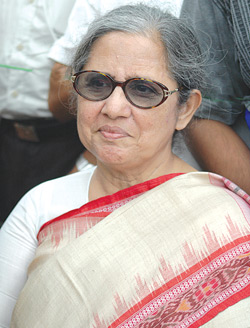|
|
| NOT PERHAPS AMBASSADOR MATERIAL: Shailaja Acharya is one of the more controversial nominees. |
No sooner had the government made the names of 14 ambassador-designates public last month, than the Maoists called a series of bandas, for not having been consulted on these. Faced with a day's shutdown which mocked all Nepalis' right to go about their daily lives without bowing down to Maoist diktats, the government backtracked and agreed to come up with a new list accommodating the comrades.
Such a list will include loyal members of all parties. But it is unlikely to contain Nepalis who can rise above narrow party-politics to practice the kind of diplomacy we desperately need: economic diplomacy, which results in increased sales of Nepali goods and services abroad, and additional investments in Nepal.
This is essential to re-frame the way the world views us: not as a perpetual charity case, but as a potential trading partner. Our netas wax eloquent about how the world drops everything to applaud our evolving political processes. But as a relatively insignificant country on the global stage, we do not make our two giant neighbours and the world's only superpower uneasy. And while the rest of the world may wish us well, but could not care less what we are up to. The only way to matter to other countries today is by increasing our volume of trade with them.
And that is where economic diplomacy comes into play. Running a diplomatic mission is not about setting up a taxpayer-funded dormitory in a foreign capital for politicians' sons and daughters. Nor is it a sinecure for services rendered to one's political party in Kathmandu. Nor either is it about engaging other countries about the finer points of Maoism, Marxism, or socialism. The world is not interested in Nepal's so-called 'soil-suitable' political philosophies which make life easy for netas and difficult for citizens.
We need to rethink the process of choosing ambassadors in today's globalised loktantrik Nepal, and ensure that we have affirmative answers to these three basic questions:
. Can this nominee be a credible salesperson for Nepal?
. Can she work effectively with the Ministries of Commerce, Labour, Hydropower, and Tourism, and with members of the Nepali diaspora to make it easier for others to trade with Nepal?
. Can she help boost tourism, make it easier for Nepalis to work abroad, and attract investment to Nepal?
It's not enough to dispatch a few smart young economic officers to missions abroad. In most cases, they get unfairly lorded over by grey-haired ambassadors who, with deeply entrenched sarkari attitudes, dislike seeing juniors doing well.
Given how politicised diplomatic talents have become, we also need to create space for successful, self-confident and non-party political Nepalis who are willing to measure their own ambassadorial performances by how they lead their respective teams to 'sell' Nepal as a commercial and a recreational destination.
The selection process we have repeats the Panchayati practice of paying no attention to national aspirations while rewarding loyalists. Such practice routinely puts the training and orientation needs of ambassador-designates on the backburner, leaving them unprepared to be effective envoys. No surprise then that the most tangible consequence of such appointments for the nation are the catfights over which parties get what spoils of loktantra.




